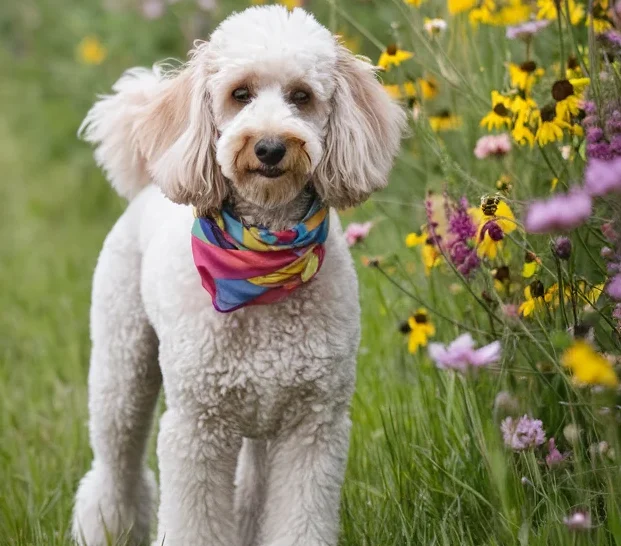The Poodle: A Comprehensive Guide to This Elegant and Intelligent Breed

Poodles are one of the most recognizable and beloved dog breeds in the world. Known for their intelligence, elegance, and unique curly coats, Poodles come in three sizes: Standard, Miniature, and Toy. Whether you’re a first-time dog owner or a seasoned pet enthusiast, Poodles have something special to offer. In this guide, we’ll explore everything you need to know about Poodles, from their characteristics to their care requirements.
1. Why Poodles Make Excellent Pets
Poodles are popular for several reasons:
- Intelligence: Poodles are among the smartest dog breeds, known for their ability to learn commands and tricks quickly. Their intelligence makes them highly trainable and adaptable.
- Hypoallergenic Coats: Poodles have a curly coat that traps dander and hair, making them a great option for allergy sufferers. While no dog is completely hypoallergenic, Poodles tend to produce less allergens than many other breeds.
- Affectionate Nature: Poodles are known for their loyalty and affection towards their families. They thrive on companionship and enjoy being involved in family activities.
- Versatile Sizes: With Standard, Miniature, and Toy sizes, Poodles can fit into various living situations, from large homes to apartments.
2. Types of Poodles
Poodles come in three distinct sizes, each with its own characteristics:
- Standard Poodle: The largest of the three, Standard Poodles stand over 15 inches tall and weigh between 40 to 70 pounds. They are known for their athleticism and are often used in dog sports and as service dogs.
- Miniature Poodle: Miniature Poodles stand between 10 to 15 inches tall and weigh around 10 to 15 pounds. They are energetic and playful, making them great companions for families and individuals.
- Toy Poodle: The smallest of the three, Toy Poodles are under 10 inches tall and weigh around 5 to 10 pounds. They are perfect for those looking for a compact companion who enjoys cuddling.
3. Caring for a Poodle
Owning a Poodle requires commitment and understanding of their specific care needs:
- Exercise Requirements: Poodles are active dogs that require regular exercise. Daily walks, playtime, and mental stimulation are essential to keep them happy and healthy. Aim for at least 30 to 60 minutes of exercise per day, depending on their size and energy levels.
- Grooming Needs: Poodles require regular grooming to maintain their curly coats. Brush their fur at least once a week to prevent matting and schedule professional grooming every 4 to 6 weeks. Regular bathing and ear cleaning are also necessary to keep them clean and healthy.
- Diet: A balanced diet is crucial for your Poodle’s health. Choose high-quality dog food appropriate for their size and life stage, and monitor their portion sizes to prevent obesity.
- Health Care: Regular vet check-ups are essential for monitoring your Poodle’s health. Common health issues include hip dysplasia, eye disorders, and skin conditions. Keeping them active and maintaining a healthy weight will help reduce health risks.
4. Training Your Poodle
Training is an important aspect of owning a Poodle:
- Start Early: Begin training your Poodle as a puppy. Basic commands like sit, stay, and come are essential for their safety and good behavior.
- Positive Reinforcement: Poodles respond well to positive reinforcement techniques. Use treats, praise, and playtime to reward good behavior, helping to motivate them and build a strong bond.
- Socialization: Early socialization is crucial for Poodles. Expose them to different environments, people, and other pets to help them develop into well-rounded and confident adults.
5. Living with a Poodle
Poodles adapt well to various living situations:
- Apartment Living: Poodles can live comfortably in apartments as long as they receive adequate exercise and mental stimulation. Regular outdoor activities will keep them happy and healthy.
- Family Pets: Poodles generally get along well with children and other pets, making them excellent family companions. Supervise interactions between Poodles and young children to ensure gentle play.
- Barking: Poodles can be vocal dogs and may bark to alert you of anything unusual. Proper training and socialization can help manage excessive barking.
6. Fun Facts About Poodles
- Agility Champions: Poodles excel in dog sports, including agility, obedience, and even hunting. Their intelligence and athleticism make them top competitors.
- Royal Roots: Poodles were originally bred as water retrievers, and their name comes from the German word “Pudel,” meaning “to splash in water.” They were favored by nobility in Europe, further enhancing their elegant reputation.
- Variety of Colors: Poodles come in various colors, including white, black, apricot, and gray. They can also have unique patterns, such as parti or phantom coloration.
Conclusion
Poodles are a remarkable breed that brings intelligence, affection, and elegance to any household. Their hypoallergenic coats, versatility in size, and loving nature make them ideal companions for individuals and families alike. By providing them with regular exercise, proper grooming, and training, you can ensure that your Poodle lives a happy and fulfilling life. If you’re looking for a loyal and intelligent companion, a Poodle may be the perfect addition to your family!



